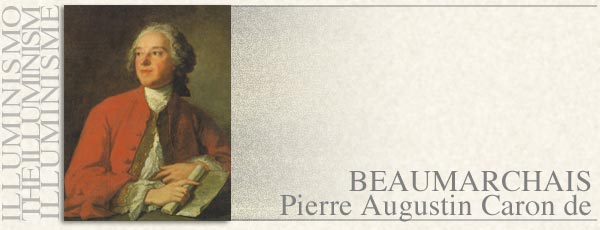|
|

| 1721 Date of birth of Madame de Pompadour |
|
1732 |
24 January the date of his birth, in Paris. |
|
1745 |
He is known as a good watch and clock maker. |
| 1745 The arrival of Madame de Pompadour at the court |
|
1754 |
Thanks to a new device in watch making (that he invents and disputes with the famous Lepaute), he is introduced at the court of the King. |
|
1755 |
He becomes “Contrôleur de la bouche” in Versailles. |
|
1756 |
He got married and takes the name of Beaumarchais, that shares with his favourite sister, Julie. |
|
1757 |
He meets Lenormant D’Etiolles, husband of Madame de Pompadour, and writes a few shows for the private theatre of Etiolles.
|
|
1759 |
He becomes Master of Harp of the daughters of the King, Louis XV. |
|
1760 |
Beaumarchais meets the financer Paris-Duverney who helps him in business. |
|
1761 |
He becomes Secretary of the King. |
|
1763 |
He becomes Lieutenant of the Hunting. |
| 1764 The death of Madame de Pompadour |
|
1764 |
He travels for business on behalf of the Count Duverney. |
|
1767 |
He is allowed to exhaust the forest of Chinon. |
|
1768 |
He got married for the second time with a young widow, Mme L’Eveque. |
|
1770 |
The performance and failure of a second drama “Les Deux Amis”. |
|
1772 |
He becomes a secret agent of Louis XV. |
|
1773 |
“Le Barbier de Sèville” arrives at the Comedie Française. |
|
1774 |
The mission in England, the Netherlands and Austria. |
|
1775 |
In London, the negotiations with the knight d’Eon. |
|
1776 |
His value is restored and the Public Treasure gives him money to organize an expedition in America to help the rebels. |
|
1777 |
The date of birth of Eugènie de Beaumarchais. He founds the Society of Dramatic Actors, in order to give them the opportunity to receive a better wage.
|
|
1778 |
The end of the Le Blanche affair: the court of Aix en Provence absolves Beaumarchais.
|
|
1779 |
The debut of the editing of Voltaire’s works, as well as Rousseau’s, La Bruyere’s and many others.
|
|
1780 |
The acknowledgement of the Society of Dramatic Actors.
|
|
1781 |
“Le Mariage de Figaro” is received by the Comédie Française. |
|
1782 |
Despite facing a lot of problems to perform the play “Le Mariage de Figaro”, he is busy working.
|
|
1784 |
In March he is charged for having injured the king and imprisoned for a few days, while the editing of Voltaire’s work is prevented. |
|
1785 |
“Le Barbier de Séville” is performed at the court (Marie Antoinette plays Rosine).
|
|
1786 |
He got married with Marie-Thèrèse de Willermaulas.
|
|
1787 |
He acquires an estate by the Bastille and builds a sumptuous house.
He writes “Tartare” (the music is written by Salieri).
|
|
1789 |
The third memoir against Kornman is published.
|
|
1790 |
The end of the editing of Voltaire’s works, a financial failure. |
|
1792 |
The debut of the affair “Des fusils en Hollande”. |
|
1794 |
He emigrates to live in the Netherlands and in Germany.
|
|
1795 |
He cannot return to France.
|
|
1796 |
He returns in Paris.
|
|
1799 |
In May 18, Beaumarchais dies in Paris.
|
![]()